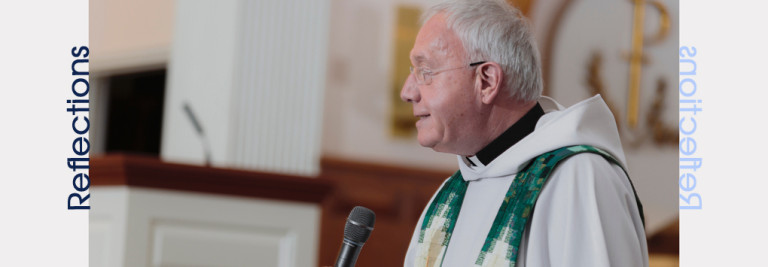March 1, 2015
First Sunday of Lent
More Than Fish On Fridays
Dear Parishioners,
You don’t have to be Catholic to be familiar with the question What are you giving up for Lent? Giving something up is only one-third of the traditional Lenten disciplines of prayer, fasting and almsgiving, yet it seems to have a fairly deep grip on the cultural imagination. McDonald’s Lenten observance includes ramping up the production of Filet-O-Fish since we give up meat on Fridays. Some people even give up the Internet’s holy of holies, Facebook. Talk about going to extremes!
Yet, as much as there’s an attraction to the romance of giving something up, I sometimes think that what I really need is something more: more silence, more time spent in service of the poor, more prayer, more turning the other cheek, more treating people nicely, and more praying for my enemies. My life is often full of things that take me away from who I really want to be, and Lent is a golden opportunity for me to fill my life with more of what is truly important.
Like anyone who tries to impress the person they love, we want to show our dedication and do something difficult for God, and so we find something that’s challenging to do or give up. But, the deeper challenge isn’t giving up coffee or chocolate or even, God forbid, Facebook, but rather embracing real, heartfelt positive change. Lent isn’t about particular outward observances, but a contrite and sincere return to the Lord who will, once again, lead us to Easter joy.
Many of you know that I’ve been following Thomas Merton since I was a teenager. The following reflection from Merton found its way to my desk; I’d like to share it with you:
“Merton’s continuing insistence that there is no real spiritual development until we plumb the depths of the self to determine who we are – without the masks, without the labels – is a call to honesty and to self-criticism. The difficulty lies in the fact that both qualities are long lost in the ‘Madison Avenue’ approach to life. In this world, life becomes a matter of creating images of who I aspire to be rather than setting out to understand who I really am. What really drives me, what I really think and want and care about are the raw materials of me. It is out of these things that the self emerges, shapes and forms itself, and finally, finally, finally comes to fullness.
What Merton calls us to do as part of this slow but fulfilling process depends on the raw and ruthless debunking of the self to the self that is the ground of humility. He challenges us all to cling to the reality that is ourselves rather than enshroud ourselves in the cosmetic world around us, mere specters of who we are each meant to become. He calls us to the most daring truth of all, the truth of who we really are. In the center of the self. In the heart of us. Behind the veils.
But it is not a simple process. To discover the real self implies the peeling away of the layers of persona we have so carefully cultivated for the sake of fitting into a plastic world full of other plastic images. It requires, as they say in publishing, the courage to refuse to believe our own press. Until that happens we risk the danger daily of falling down the rabbit hole of the self. We begin to see ourselves as above, beyond, different from, superior to all the other mere mortals around us. In political language we call it ‘exceptionalism.’ In spiritual dialects we call it ‘holiness.’ We find ourselves outside the pale of basic spiritual disciplines, above the appetites that score the rest of the human race, psychological robots made out of the stuff of a papier-mâché world.
It is the task of a lifetime to work with the basic instincts and urgings, soul shifts and values, desires and hopes within us to become the fullness of the raw material of the self. But unless we do, we doom ourselves to buy into the empty images every new world creates to define itself: successful man, tough urban cowboy, wealthy woman, clerical dandy, wonder woman, obedient disciple, leader, stereotype of whatever becomes the fashion of the time.”
(Excerpt from “What We Have To Be Is What We Are: Merton’s Unfinished Agenda,” a reflection in We Are Already One (Fons Vitae), newly released book of short essays from 100 contributors to honor Merton’s centenary (1915-2015).)
Fr. Leonard+



